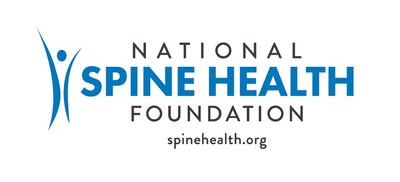National Spine Health Foundation Calls for Better Understanding of Spine Health, Education and Supportive Care in 2025
RESTON, Va., Dec. 13, 2024 /PRNewswire/ -- Four out of five people experience back pain at some point in their lives, and 100 million Americans suffer from chronic back or neck pain that lasts longer than three months.1 In fact, low back pain is the leading cause of disability in the United States and around the world. Recent headlines have brought the conversation around chronic back pain into the spotlight. As a patient advocacy group, the National Spine Health Foundation (NSHF) believes this is an important opportunity to focus on spine health and chronic back pain.
4 out of 5 people experience back pain in their lives. 100 million Americans suffer from chronic back or neck pain."As the CEO of NSHF and someone whose chronic back pain was cured with surgery, I am very aware of how spine pain affects American society, from work to home," said Rita Roy, MD, NSHF CEO. "Not only is the spine central to the entire body, it plays an essential role in supporting the body's structure and vital functions. It protects the nervous system, facilitates movement and enables communication between the brain and the rest of the body."
The spine also is one of the most underappreciated and misunderstood body parts, which can lead to unnecessary fear and anxiety about spinal health, Dr. Roy continued. That fear and misunderstanding can result in the neglect of proper spinal care, exacerbation of existing conditions and a hesitancy to seek timely medical advice for spine-related issues.
"If you are moving while you read this on your phone, tablet or in print, you can thank your spine," said Dr. Roy. "The spine's role as the highway of information for our bodies means that even though you are reading, it is facilitating the subconscious messages between your brain and the rest of your body to move your eyes, rotate your head or take a step between."
Disrupting this highway can have serious impacts on your life. For example, chronic back pain can significantly disrupt daily life, creating substantial limitations in daily activities, such as eating, bathing and getting dressed. The pain and limitations reduce quality of life and can cause dramatic social and occupational changes along with increased financial burden.
In addition, there is an association between back pain and psychosocial factors. Depression is the most common emotional feeling associated with neck and back pain, and major depression is four times more likely in patients suffering from chronic back pain. On average, 62% of patients with back pain also show signs of depression, and the severity of depression increases linearly with severity of pain.
Overcoming back pain is a journey, and understanding the process of spine care is the first step. Education plays a key role in successful patient outcomes and learning how to care for one's spine is necessary from an early age. Studies have shown that patient education directly correlates to post-interventional outcomes by diminishing fears and setting realistic expectations for recovery. The ability to prevent back injury and pain is personal and can be achieved with the proper education.
"In some cases, surgery is necessary, so education is key for helping patients understand the journey toward surgery. Evidence-based literature supports surgical treatment for the right conditions, and outcomes usually are excellent. Unfortunately, some patients have persistent pain despite surgical treatment," according to Todd Albert, MD, Chair of the NSHF Scientific Board.
In addition to education, NSHF focuses on patient advocacy to develop a more cost-effective approach to spine care and prevention in the United States with the goal of reversing the increasing trends of back pain incidence and reducing the economic burden of spinal disorders. The World Health Organization has acknowledged the impacts of spine care and the need to reform health policy surrounding back pain, emphasizing the need for sustained and coordinated support from the legislative, labor, health and government sectors.
"We call on our legislators and our healthcare system to make this reform a priority in 2025, and NSHF is ready to collaborate with all involved to support the necessary changes," said Tom Schuler, MD, Chair of the NSHF Board of Directors.
Every journey to spinal wellness is unique and complex, and the NSHF takes its role as the nation's only patient-centric nonprofit organization centered around spine health very seriously, Dr. Roy shared.
"Our consortium of leading researchers and spine doctors and our network of Americans who have thrived after spine problems are here to guide and empower, wherever you are on your path from awareness to recovery," she concluded.
About National Spine Health Foundation
The National Spine Health Foundation (spinehealth.org) is a non-profit, patient-focused 501(c)(3) dedicated to improving spinal health care through research, education, patient advocacy and community. We are dedicated to proving what works, driving innovation and supporting patients on their journey to spinal health. Our educational resources and research studies empower patients with knowledge and hope. Join NSHF for Spine- Talks®, Unparalleled Access to World-Class Experts, a unique educational platform designed to improve lives through knowledge and hope and featuring hundreds of hours on the latest diagnostics, therapeutics and technological advancements.
1 https://www.ncbi.nlm.nih.gov/books/NBK586768/
![]() View original content to download multimedia:https://www.prnewswire.com/news-releases/national-spine-health-foundation-calls-for-better-understanding-of-spine-health-education-and-supportive-care-in-2025-302331414.html
View original content to download multimedia:https://www.prnewswire.com/news-releases/national-spine-health-foundation-calls-for-better-understanding-of-spine-health-education-and-supportive-care-in-2025-302331414.html
SOURCE National Spine Health Foundation


